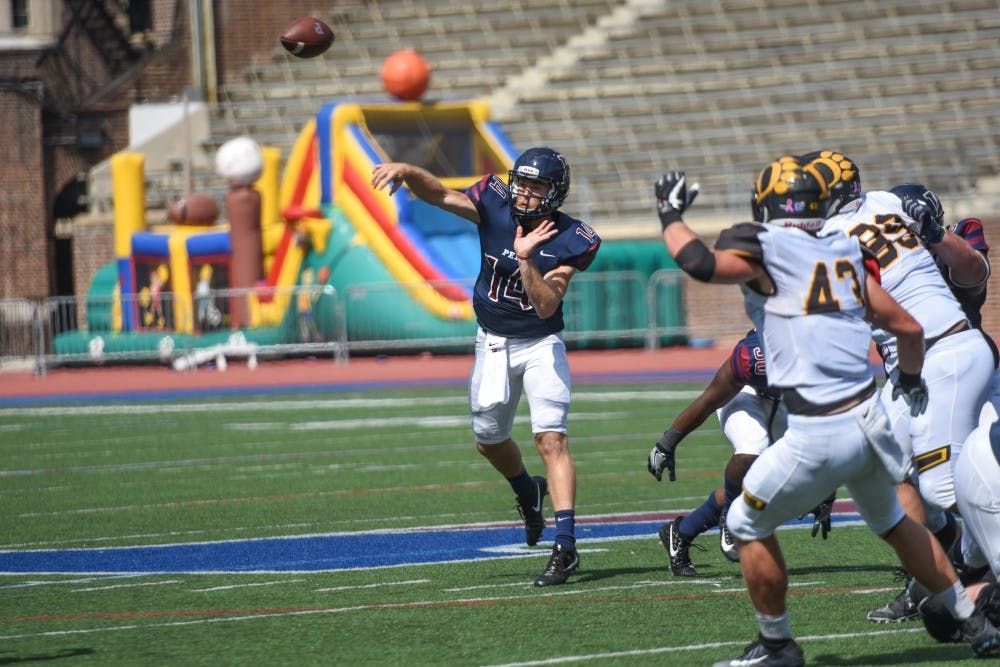
Senior quarterback Will Fischer-Colbrie will look to use the momentum of last week's three-TD performance in this weekend's Ivy opener.
Credit: Zach SheldonAnything can happen on any given Saturday. Or in this case, Friday night — under nationally-televised lights.
That is especially true in Ivy League football. With parity in the Ancient Eight arguably the highest in recent memory, a single play could spell the difference between a championship and fourth place.
Dartmouth, who plays Penn on Friday night in a game televised nationally on NBCSN, gave a great example of this last week. The Big Green (2-0) held on to beat No. 25 Holy Cross 27-26 in overtime due in large part to two blocked kicks in the fourth quarter. One play – a blocked extra point with three seconds on the clock – was the difference.
Penn (2-0) coach Ray Priore has a pretty good understanding of league parity. In his first two seasons as head coach, the Quakers have won fractions of the Ivy League title. Last year, the margin between champion and third place was one game.
Priore also understands the importance of special teams and stressed the large role they play in what forecasts to be a tight conference matchup.
“I think special teams – in big games it typically comes down to being really important,” Priore said. “Making sure we are covering kicks well, making [extra] points. That’s how Dartmouth came through against Holy Cross last week.”
The man that should be most concerned about Dartmouth’s two blocks is junior kicker Jack Soslow. Soslow, who is perfect on PATs two games in, is unfazed by the threat of Dartmouth’s kick blocking unit.
“I’m comfortable with my kicks that I’ll always get it over the [defensive] line and always get it off before the people on the outside get to me.” Soslow said. “There’s nothing that I’m worried about. I don’t think the two blocks are going to affect me at all.”
The mental toughness and confidence of Soslow is matched by the team's first-year starting quarterback, senior Will Fischer-Colbrie. With two non-conference wins under his belt, he feels much more comfortable now than he did at the start of the season.
“[Against ODU], I think I came out and put a lot of pressure on myself to perform. The first half that didn’t really work out too well for me,” Fishcer-Colbrie said. “But having some success against Lehigh, and gaining a lot of faith in the guys around me during a live game means a lot entering Ivy play.”
With a more relaxed quarterback leading the offense against Lehigh, the Quakers' offense put up an astounding 63 points. Part of that can be attributed to Lehigh’s porous defense which has allowed an average of 51.25 points per game, but that doesn’t take away the success of a balanced Penn attack.
The balance of this Penn offense was a concern before the season began. With a first-year quarterback holding the reins and great positional players in Tre Solomon and Justin Watson, one might be forgiven for assuming the offense would run through them. Instead, Fischer-Colbrie has spread the ball around admirably: four receivers are averaging over 20 yards per game.
On the defensive side of the ball, Priore and his staff have placed an emphasis on takeaways. In two games, the defense has forced five, excluding the strange interception-return-for-PAT at the end of the Lehigh game. Interestingly, Dartmouth has lost three fumbles, seemingly playing into one of Penn’s largest strengths. Priore suggested that the turnover battle, particularly as it relates with the time of possession, will be important for the Quakers as they open the conference campaign.
Like Penn, Dartmouth’s offense begins on the ground. Running back Ryder Stone is a yard short of averaging 100 per game. As a team, the Big Green have run the ball almost 70% of the time. The Quakers are more balanced but have gaudier statistics thanks to the emergence of Karekin Brooks. Priore also hinted at the possible return of senior running back Tre Solomon against Dartmouth, giving the Red and Blue perhaps the most formidable rushing attack in the conference.
Even without Solomon, the Quakers seem prepared and well-equipped to handle the Big Green on paper.
The problem is: in Ivy League football, that isn’t always enough.
The Daily Pennsylvanian is an independent, student-run newspaper. Please consider making a donation to support the coverage that shapes the University. Your generosity ensures a future of strong journalism at Penn.
Donate



